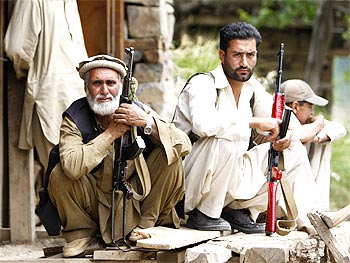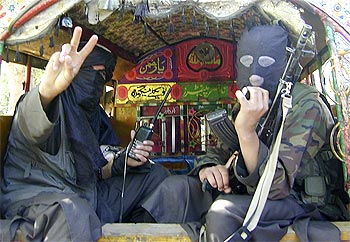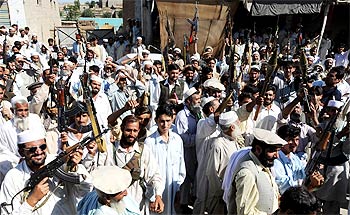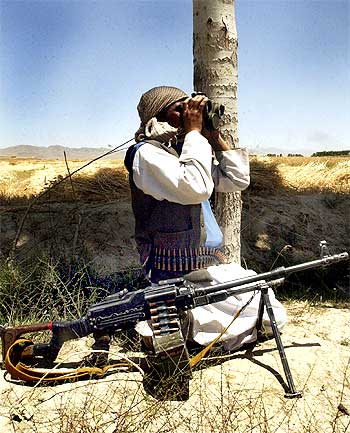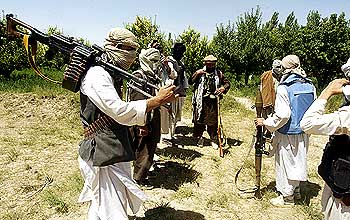 | « Back to article | Print this article |
Unveiled: The honour code for Taliban fighters
Taliban spokesman Qari Omer confirmed to rediff.com the release of the 61-page document, which Taliban leader Mullah Omar wants all mujahideens to carry with them.
The booklet is divided into 13 chapters and outlines 68 strictures for conduct. Taliban first issued a 'Layeha' way back in late 2006; it comprised 15 pages with 29 strictures in it.
The cover page (see image) of the document has a preface by Mullah Omar, the Amir-ul-Momineen (chief) of Afghan resistance, which is translated as:
Dear mujahideen brothers!
'Hope all of your activities and thinking comply with Quran and Sunnah. Stand like a rock in front of enemy and never lose your heart! You should have positive attitude towards your fellow mujahideen and the public; it will have a good impact on their response, the enemies are trying to create a rift amongst you but never provide them an opportunity. While punishing a person, never hurry and keep aside your personal interest and feelings. During fighting, try your best to avoid civilian casualties'
With best wishes,
Amir-ul-Momineen
Unveiled: The honour code for Taliban fighters
In the Layeha, there are some pages mentioning the importance of jihad (holy war). It says, 'Jihad is the only way for the integrity of the Muslims. Nations that carried out jihad against the infidels remained successful and enjoyed freedom, and those who deviated from the way of jihad were encircled by miseries.'
'Today, the mujahideen are fighting, making sacrifices; they are on the right path. It was strongly felt that there should be some code of conduct for the mujahideen and there was a severe need of the 'Layeha' to enable them to achieve their targets under the correct teaching of Islam. So, leading Taliban clerics, muftis and other religious scholars were invited from all over Islamic Emirates (Afghanistan) and after counselling with them, the Layeha was prepared consisted of 13 chapters and 67 sections. All mujahideen would abide by the rules of Layeha.'
The rulebook's 13 chapters delve upon peace, prisoners, espionage, helping enemies logistically, booty, strategies, Taliban's internal affairs, education, organisation, social issues, prohibitions, worships and recommendations.
The conducts are mentioned as under:
1. We ask everyone working with infidels to quit their jobs. Whoever accepts this offer would be given amnesty. Those who, while working with infidels personally damaged the Taliban, do not fall under this category. Their case will be forwarded to the provincial Taliban head for consideration.
2. If those who have been given amnesty had harmed some individuals during their job, they should approach the affected persons for apology. If someone had accepted bribe during his job and he is now with the Taliban, he should return the money to the owners.
If the surrendered person acquired any loan from the department where he served, he will have to return the amount.Unveiled: The honour code for Taliban fighters
3. If Taliban have warned a person working with infidels but he continues to serve them, his case would be decided by high Taliban commanders.
4. If a person who has been given amnesty is killed by a Talib, he would be punished as per Islamic law.
5. A person, who before joining Taliban was a hardcore enemy of the Taliban but has now killed some high-ranking infidels or hands over some foreigners to the Taliban or if he brings in some sophisticated weapons, his case would be forwarded to the Taliban high command for consideration. (According to old Layeha, anyone with bad reputation or who has killed civilians during jihad may not be accepted into the Taliban movement. If the highest leaders have personally forgiven him, he will remain at home in the future).
6. If someone from the opponent group proposes to a Mujahid that he would not attack the latter if they would not attack him, no such agreement would be accepted. The Mujahid would inform his district head and he would forward the issue to the top for consideration. If the case was considered, then no mujahid could harm the person serving in the opponent group.
7. A mujahid, who takes a foreign infidel as prisoner with the consent of a group leader, may not exchange him for other prisoners or money.
8. If a soldier, staffer or contractor of the infidels is arrested, his case would be decided by the Taliban provincial commander. But he would never be freed just for money. Nobody can kill him without the consent of Mullah Omar or his deputy.
9. If the Taliban arrested a non-Muslim, his case would be decided by the two topmost leaders -- whether to kill him, make an exchange of prisoner or to free him; If the mujahideen needed money for a certain mission, it would also be decided by Amir or his deputy. If the hostage converted to Islam and if in his return some Muslim could be freed -- after knowing the willingness of the newly converted Muslim -- such an exchange could be made.
10. If the mujahideen arrested someone and are attacked while on their way to the 'markaz' (sub-division) with him, the mujahideen will decide whether they want to keep him or not; they are allowed to kill him. However, the mujahideen will have to be sure that the arrested person was a prisoner of war and not someone who has been picked up under doubtful circumstances -- the latter will then have to be freed.Unveiled: The honour code for Taliban fighters
11. If a soldier or policeman has surrendered to the mujahideen, nobody is allowed to kill him; Additionally, if he comes with some weaponry his deed would be lauded.
12. If a regional commander awarded a spy or some criminal with death penalty without the consent of the Amir or his deputy, the executer is not allowed to act upon the orders, as it is anti-Islam act.
13. Any person convicted of espionage will be considered the root of all vices. A regional chief can punish him or oust him from the area or try to keep him away from such acts in the future. But no one could award him death penalty apart from Imam (Mullah Omar) or his deputy.
14. When someone is arrested on charges of being a spy, while deciding his case at least one of these conditions should be met: a) Two witnesses; b) A confession; c) Recovery of equipments being used in espionage; d) Statement by someone who possesses an untarnished religious reputation.
15. Confession of spying under torture, threat or use of some other force would not be considered and he would not be taken as a criminal. If someone is told that he will not be tortured or killed if he confesses his involvement, such a confession will have no worth. However, if someone is told that he will be given high posts or money in return for a confession, the mujahideen will have to keep their words.
16. If the mujahideen doubt that someone is a spy and the accused is not an employee of any secret agency, the mujahideen can still seek action against him; they will have to inform their regional chief.
17. If there is no evidence against someone who is suspected to be a spy in the eyes of the Taliban, the accused will still have to provide the regional head with an affidavit, or bring someone for bail.
18. If charges proved against someone, whether a spy or someone involved in some other case, and concerned authorities have issued his death orders, he would be gunned down. Nobody will be allowed to record video of the incident.
19. If infidels' vehicles are torched, their drivers would be freed under some agreement, but it is strictly forbidden to take any money for their return.
20. If a driver is arrested while carrying infidels' goods, regional chief has the authority to punish him; propose an exchange of prisoner or free him under certain reconciliation process. If a driver tried to run, the mujahideen are allowed to open fire on him.Unveiled: The honour code for Taliban fighters
21. If a contractor, involved in constructing bases for infidels and supplying fuel, did not stop his activities despite the mujahideen's warning and is arrested, the regional chief could punish or propose an exchange of prisoners in his return. The regional chief can also free him on bail. If the regional chief has to kill him, he will need consent of Amir or his deputy. If a contractor did not refrain despite the Taliban's warning, the mujahideen are allowed to kill him whenever he is found.
22. The materials snatched from the infidels are called 'Ghaneemat', 20% of the items would be sent to main Taliban treasury while rest of the 80% will be distributed amongst the mujahideen who fought that particular battle.
23. If the area of infidels is captured after resistance, materials recovered would be distributed amongst the fighters while if the opponent surrenders without showing any resistance then the goods would be sent to the mujahideen treasury.
24. If the goods of slaved organisation is seized or if it is captured from the foreign occupant and would be sent to 'Baitul Maal' (treasury).
25. If an official took some money from a bank to distribute it amongst the workers and the mujahideen arrests him, they could take possession of the amount as it is still the property of the infidels. But if it was distributed amongst the workers, then the mujahideen cannot take it from them.
26. If the mujahideen tried to take possession of goods being carried to the infidel forces and a battle took place, it would distributed like 'Ghaneemat' while if there was no resistance, the goods would be sent straight to 'Baitul Maal'.
27. Provincial authority should form a commission of at least five highly religious persons at the provincial level to take care of the affairs of the Taliban. This commission would further form five members commission at the district level; all would remain in touch.
28. The commission will keep close watch to avoid bad elements from becoming a part of the mujahideen, will make conciliation if there was some rift inside the mujahideen and will solve problems between the mujahideen and the locals.
29. Those districts where mujahideen activities are visible, the provincial head should appoint a head and a deputy for that particular district.
30. No one is allowed to form a new group of his own while in case of extreme need, the provincial head can allow formation of a group; all splinter groups would be disarmed.Unveiled: The honour code for Taliban fighters
32. A district head should form a judicial commission comprising a Qazi (judge). Whenever the district Qazis find it difficult to decide on certain cases, they would be forwarded to the commission.
33. Provincial head of the Taliban can make certain changes in the mujahideen set-up with the help of his deputy. In the same way, the district commander, after counselling with his deputy, can make changes. In both cases, if the head and deputy did not agree on an issue, it would be forwarded to the high Taliban.
34. Every Talib is accountable to his group leader and the group leader to his district level leader.
35. A leader would have to be honest, skilled, pious and generous.
36. Any Mujahid found guilty can be expelled from the group by his head. His case will be sent to the provincial judicial commission, and if the charges were proved, then nobody can challenge the commander's decision. In case he repented his act, the provincial head and the judicial commission can review over the decision.
37. The head of a certain district or province can go to other districts or provinces for jihad but after the consent of host commander. A person who visited other provinces or districts will fight under the leadership of the host Taliban head.
38. If a Taliban provincial head has his men active in another province, he will introduce those to the current provincial head. All Taliban activities will be carried out under their present commander; nobody from outside can interfere.
39. If some Talibs rush to another province to carry out jihad there, the head of host province will not allow them until he did not confirm their identity.
40. No Taliban head has the authority to take other group's men; if both Taliban leaders agree to let go a member, then that Talib will have to return their arms etc to their ex-head.
41. Conditions for 'Fidayeen' suicide bombers are: They should be well skilled. Their target will be high valued. They will avoid civilian casualties and will have to seek the regional head's consent. Suicide bombers assigned with special task by the central Taliban command do not fall under this category.
42. Central Taliban commission will introduce teaching and training courses. The provincial and district authorities would follow the central commission in all education related issues.
43. Foreign organisations and companies will seek the Taliban commission's consent.Unveiled: The honour code for Taliban fighters
44. If locals approached any Taliban commander to settle disputes, every commander is not allowed to make a decision. Only the head of province and his deputy could make any decision between the two groups -- For making any decision, a council of leading clerics will be invited.
45. Cases decided by Mullah Omar will not be reviewed.
46. Almost all Taliban commanders should try their best to avoid civilian deaths during fighting. If someone did not pay heed, he will be punished.
47. If someone misused the Mujahid name for his personal interest, on complaint, he will be expelled from the Taliban ranks.
48. The campaign of collection of arms was going on with zeal and zest, but now it is completed. Currently someone might not be forcibly asked to present his weapon in the name of Baitul Maal.
49. As mentioned in the previous Layeha, smoking is banned completely.
50. The mujahideen are not allowed to take young guys with no facial hair to battle, training centres and other places.
51. No one is allowed to deface someone by cutting his ear, nose and lips, as it is un-Islamic.
52. The mujahideen would not collect forcibly 'Zakaat', 'Ushar' and other donations from the public.
53. The mujahideen would not enter someone's house during search. If it is strongly needed, they will first seek permission of the regional head and will enter the target home accompanied by an imam and two old persons of the area.
54. No person would be picked for ransom and if someone was found involved, he would face the music.55. Every faction's head is required to arrange classes teaching the mujahideen about religion, jihad and moral values.
Unveiled: The honour code for Taliban fighters
56. If there is no danger, the mujahideen should visit a mosque for 'Jamaat'. If they are busy, they should arrange it at their own places.
57. Reciting of holy Quran and 'Zikr' (remembrance of the divine) is must, as with such practice a person becomes contented and patient.
58. All workers of Islamic Emirate should try to convince people working with opponent party to surrender. It would weaken the infidel forces and through this the mujahideen could also get some weaponry.
59. The mujahideen should handle general people politely. They could win hearts of people and would be welcomed everywhere.
60. The mujahideen should not indulge in ethnic and nationalism-related issues.
61. Every Mujahid would be accountable to his commander.
62. The provincial and district heads should arrange meetings to find the best way for fighting the infidels.
63. The mujahideen should follow local dresses like shoes, clothes and hairstyle. It will enable them to get into the public and know their problems.
64. Taliban Shura (supreme council of the Taliban) could only make changes in the Layeha, on other person having the authority.
65. Central, provincial and district commissions of the Taliban will circulate the Layeha amongst Taliban.
66. If some issues come before the Taliban, the solution to which is not present in the Layeha, the district council should solve it. If the district council also fails, then the issue should be forward to the provincial commission and thus onward to the central Shura.
67. Every Mujahid should abide by the above rules. Anyone who violated these codes must face trial under Islamic Emirates.

